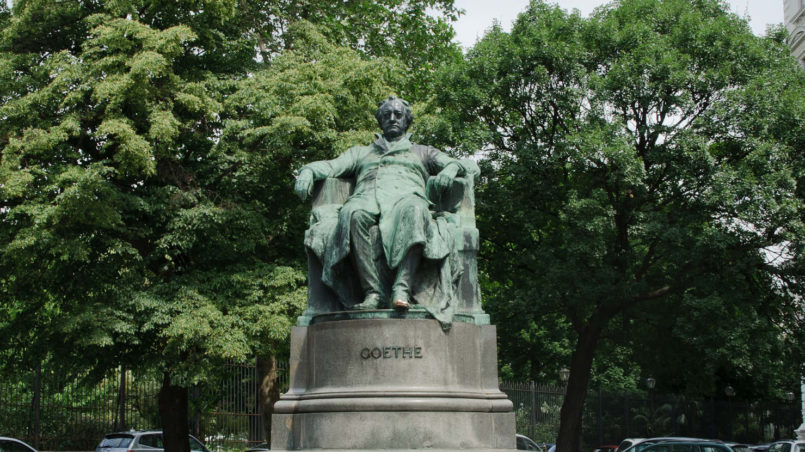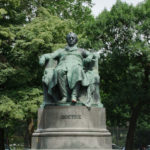Goethe’s Spirituality (Goethe’s Connection to the Bible)

In the last article on spirituality in the ancient occidental tradition we tried to show to some extent how an astonishingly constant essence remained in the different ways of speaking about the destiny of man and his relationship to existence in general.
(Article: Spirituality in the ancient occidental tradition)
With regard to Christianity, for example, we were thus able to learn to understand – and enjoy – the speech of “God” with inner freedom in relation to the Christian world of ideas. So soon all religions, and all religious and spiritual poetry above it, will appear as a treasure trove of deep poetic words of wisdom about the world relationship of man, which basically all refer to each other – and the more we can enjoy its different forms of expression, the less we have to argue about the factual truth of the concrete wording…. the more we are allowed to experience their actual common nature.
After our two-part introduction, we now want to turn to the era of Weimar Classicism. Not only because he is world famous and highly esteemed in general, but also because I am a writer from Weimar, it is, therefore, appropriate that Johann Wolfgang Goethe is the starting point. Already early on, after a “conscious act of religious emancipation against all established, also and especially against the Christian forms of faith of the time”, he made the “way free” “to an individual religiousness “, as Günter Niggl notes. Goethe himself recapitulates in his autobiographical work, poetry and truth that he soon had the insight that “every human being, in the end, has his own religion” and that “I can also form my own” (HA IX, 350)1:“so I formed a Christianity for my private use” (HA X, 45).
Goethe’s own inner freedom, which Goethe could summon up to become a Christianity with which he had grown up, is precisely what ensures, as we have already explained in general terms, that this does not become alien to him:“Goethe still can and wants to live with the Bible”. His entire work is full of direct and indirect references to it, showing a “genuine poetic relationship with the Bible.” He has a distinctly historical-critical consciousness, which, in a sense, preceded the time and his surroundings, according to his own experience at the time to his “Pride”:
Looking at the Bible as a compiled, gradually evolving work that had been revised at various times, flattered my little arrogance by the fact that this form of thought was not yet dominant, much less so in the circle in which I lived.
(HA IX, 509)
At that time, he had already developed a “basic opinion” with regard to all tradition:
It was the one: In everything that is handed down to us, but especially in writing, it comes down to the bottom, to the interior, the meaning, the direction of the work; here lies the original, the divine, the active, the inviolable, the indestructible, the indestructible, and no time, no external influence or condition can harm this primordial being, at least no more than the illness of the body of a well-educated soul. […] how no tradition of its very nature at all could be completely pure given and, if it was also purely given, could be completely understandable at any time in the following because of the inadequacy of the organs through which it is transmitted, this because of the difference of times, of places, but especially because of the diversity of human abilities and ways of thinking[…].
(HA IX, 509)
With all desirable clarity, Goethe distinguishes here what we spoke of from the very beginning of our series: the actual and timeless core of a (religious) tradition and the various “clouding” of this core caused by cultural history. However, he also knows that “no tradition is given completely pure by their nature at all” – this would be nothing more than a general but empty and lifeless abstractness about it. Instead, he shows a clear awareness of the type of cultural colouring of the universal content of essence, from a production-aesthetical perspective (i.e. from the perspective of the author or mediator) and from a reception-aesthetical perspective (i.e. the reader’s perspective):
While no one can communicate universal truths completely purely, but rather still remains a child of his time and his culture, at the same time, however, our reception and acceptance of universal truths remain unavoidable. Reading experience, in turn, is also influenced by our own previous knowledge and individual ability and the influence of our time: this is a human-general phenomenon that applies to all human culture and all human life: we are all connected in the infinite, which, however, does not show itself “pure” anywhere, but always only in the form of its various and concrete manifestations.2
When reading the world or reading the Bible, for example, we must therefore also try to focus our mindfulness on the timeless essence of the pure human being, which is often only possible through careful sensing and approximation. Above all, however, the intimate alignment with the wholeness of one’s very own experience must never be replaced and must critically set itself free from all external influences as far as possible. This is how Goethe sums it up:
The interior, the essence of a scripture that pleases us in particular, therefore, is everything to be explored and, above all, to consider how it behaves towards our proper interior, and to what extent it is provoked and impregnated by that vitality of ours; on the other hand, everything exterior that is ineffective on us, or subject to doubt, is to be left to the criticism of which, even if it is, is to be criticized.
(HA IX, 510)
This examination of the innermost life experience of each individual applies not only to the traditional religions but, essentially, to all human life in general. Freedom can only be gained by becoming an independent counterpart in this sense. Such freedom is not an opposition. Accordingly also Goethe:”Through this term, the Bible became even more accessible to me.” (HA IX, 510) But according to the generality of insight, he also sums it up:”This conviction stemming from faith and seeing[…] is at the heart of my moral and literary life[….]. (HA IX, 510)
1 In the following, I quote Goethe mainly after the Hamburg edition under the name of Sigle HA with an indication of the volume and page number: Johann Wolfgang von Goethe: Werke. Hamburg edition in 14 volumes. Critically reviewed and commented on by Erich Trunz.
2 Thus all the individual mother tongues of the world also have their universal theoretical foundations of consciousness and are to be understood as historically grown manifestations of this universal general, but in its openness incomprehensible reservoir of possibility – which the philosopher Johannes Heinrichs was able to reconstruct impressively and convincingly in his five-volume linguistic work: Johannes Heinrichs: Language in five volumes. 2009.
Translation German-English: Anna Dichen
Credits
| Image | Title | Author | License |
|---|---|---|---|
 |
Goethe_monument_-_Vienna- | MrPanyGoff | CC BY-SA 3.0 |
